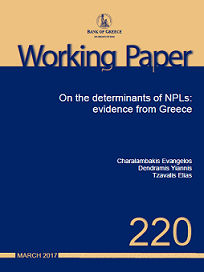Evangelos, Charalambakis, Yiannis, Dendramis, Elias, Tzavalis, (2017), “On the determinants of NPLs: evidence from Greece”, Bank of Greece Working Paper 220, March
We investigate the relationship between non-performing loans (NPLs) and their fundamentals, mainly bank and macroeconomic variables. This is done based on aggregate portfolio loans in the Greek economy. Greece constitutes an interesting case to study the factors determining NPLs, given the pervasive recessionary conditions that have characterized it since the outbreak of its sovereign debt crisis in 2010. We suggest a new econometric framework to study the above relationship which extends the SUR (seemingly unrelated regressions) framework to allow for a common break in its slope coefficient of unknown date. We show that the deterioration in the macroeconomic conditions (captured by very high rates of unemployment) and political uncertainty constitute key factors explaining the sharp rise of NPLs of the Greek banking sector after the first quarter of 2012. With the exception of bank profitability, we find that bank specific variables associated with bank capitalization and liquidity risk seem to determine NPLs only under normal economic conditions.
Relevant Posts
- Anastasiou, Dimitrios , Louri, Helen, Tsionas, Mike, (2017), “Non-Performing Loans In The Euro Area: Are Core-Periphery Banking Markets Fragmented?”, Bank Of Greece, December 2016
- Monokroussos, Platon, Thomakos, Dimitrios D., Alexopoulos, Thomas A., (2016), “Explaining Non-Performing Loans in Greece: A Comparative Study on the Effects of Recession and Banking Practices”, LSE, August




